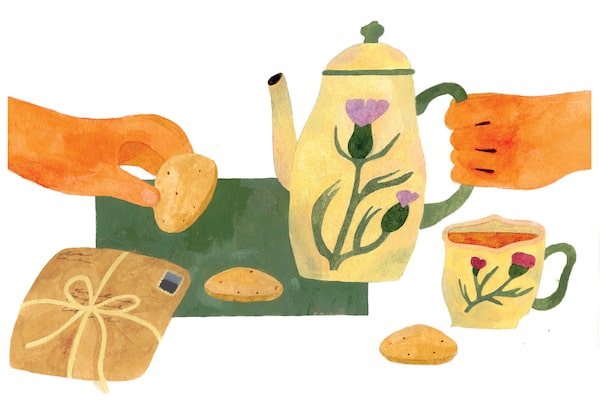First Person is a daily personal piece submitted by readers. Have a story to tell? See our guidelines at tgam.ca/essayguide.

Illustration by Mary Kirkpatrick
On the Isle of Lewis in the Outer Hebrides of Scotland, we walked through a day of wind and rain plus some hail. We were wet and hungry. But in my pack was a package of thin but sturdy, triangular oatcakes, each about as big as my hand and not at all sweet. They were so good that day, eaten during a rare splash of sunshine near the stone remains of a broch in a farmer’s field, that when we left the island, I made sure I brought packages of oatcakes home.
They reminded me of my mother’s. And when I got back, I caught the bus into downtown Fredericton to see her. Although she hadn’t made them in years, my mother was going to show me how to make oatcakes.
“Nobody taught me,” she told me. “I just remember watching Mum make them on a table in the middle of the kitchen. That’s where all the work was done. In the pantry was a barrel of flour, and stored on top, a big board, which came out on the table for baking.”
That afternoon in her apartment close to the river, we measured out quick oats, white flour, a touch of sugar, salt and soda, then worked in with our fingers some soft butter and added enough water to roll them out easily. She used the inverted lid from the sugar canister to cut out a big round, then cut the round into quarters, or farls. We baked them for about 10 minutes. Mum ate her oatcakes spread with butter and still warm from the oven, I ate mine plain. Delicious, either way. She thought we made them a bit thick and mused about the different kinds of oats, for these cakes were not quite the way she remembered her mother’s oatcakes.
Over the winter, I experimented and made more oatcakes. I used the large flake oats and rolled them very thin. They burnt quickly and were cracker-like. “Not bad,” Mum said. Then I tried a batch using the coarse, steel-cut Scots oats. They made a different dough, darker and stickier, and I rolled it out in several small batches. They baked faster and resembled the oatcakes I’d bought on the Isle of Lewis.
“These ones,” Mum said, “taste like the cakes I ate as a child.”
Since then, I’ve stuck with the steel-cut oats version, and I’ve express-mailed these oatcakes to a son with a broken wrist on the West Coast, I packed them in a zip-lock bag, cushioned with paper towels in a box, all farls arrived intact. He was dubious at first – no chocolate chips! – but cheered up when I told him oatcakes are perfect with cheese.
I’ve made so many more, and packed them well for my daughter’s three-week road trip from Fredericton to Inuvik with her partner and one very neurotic cat.
Some time later, I made a batch to take to my mother. She was tired, had lost weight and wasn’t eating well. She thought that fresh buttered oatcakes with hot tea would begin to turn her around. The oatcakes followed her into the hospital where, after a slew of tests, doctors and different rooms, she was diagnosed with advanced lung cancer and given two weeks to live.
My mother hated to be rushed into anything. She always took time to think while sitting in her lawn chair on her patio, beside her pots of lettuce, tomatoes and scarlet runner beans and her hanging pots of begonias. She liked to look out at the river and smoke a cigarette. But she didn’t have time to reconcile herself with what was happening so fast. She never did eat many of the oatcakes.
During that time, after another long day at the hospital, I left her to go home.
Late that evening, my sister phoned to say the nurse had noticed some changes and I’d better come back. Walking down the corridor to my mother’s room some 15 minutes later, the nurse stopped me. He put his hand on my shoulder and told me my mother had just died.
I still feel that shock. I still remember her body lying on the bed, her hand still warm, but she was gone. Definitely gone.
Our goodbye had been that last peaceful afternoon, me holding her hand, sometimes singing to her, knowing what was coming but surely not so soon? She wanted to start her tomatoes, read another book, follow the antics of her grandchildren, go for drives in the country and – as always – critique and eat another batch of oatcakes. She liked them rolled thin, I liked them cut thick. That afternoon she couldn’t talk any more, but she could squeeze my hand.
If I’d known it was our last day together, I would’ve slipped an oatcake, thin and good for all kinds of journeys, into her warm and eager hand.
Lynn Davies lives in Fredericton, N.B.